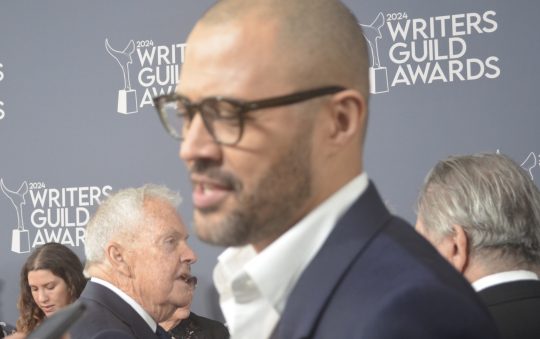
Cord Jefferson won the Oscar for Best Adapted Screenplay for the film “American Fiction,” which is based on the novel “Erasure” by Percival Everett. The story lives between those slender lines of drama and hard-biting and truthful satire as it hits it right on the proverbial head when dealing with the microaggression and pigeonholing of African American creatives in the publishing and film industry. This screenplay is the perfect example of having the movie and characters live on the page.
To tell this story, “American Fiction” focuses on Thelonious “Monk” Ellison (Jeffrey Wright), a bright and jaded author who’s at his wit’s end by the high-profit margins on African American entertainment that relies on discriminatory behaviors and tropes. To prove his point about the bias for African American narratives that make white audiences comfortable he creates an alias and writes a stereotypical, page-turning book that accidentally gains him critical acclaim and notoriety.
Related Stories:
Jefferson, a first-time director and now Academy Award winner talked about the importance of what his Oscar meant to him in light of telling a story that poked fun of and had valid criticisms about the narrow depictions of African American lives.
ON THE CONTRADICTION
CORD JEFFERSON:
Hopefully, the lesson here is there is an audience for things that are different. There is an appetite for things that are different and a story with African American characters that’s going to appeal to a lot of people. [African American films don’t] need to take place on a plantation, they don’t need to take place in the projects. It doesn’t need to have drug dealers in it an d doesn’t need to have gang members in it. There’s an audience and market for depictions of African American life that are as broad and as deep as any other depictions of people’s lives.”
ON BEING RECOGNIZED
CJ: There’s a Victor Hugo quote that says, “Nothing is more powerful than an idea whose time has come.” And so, you know, I was very passionate about this film. Everybody who worked on this film is very passionate about it. Nobody was there for the money because we didn’t have any money. So people were there because they believed in it. And so, to be here now and to receive this … feels incredibly surreal.
CJ: We didn’t have a huge marketing budget, so we relied on word of mouth a lot and people who liked the film telling other people they liked the film.
What I tried to convey in my speech is that there’s an audience for things that are different. There is — there is an appetite for things that are different. And, you know, a story with Black characters that’s going to appeal to a lot of people doesn’t need to take place on a plantation, doesn’t need to take place in the projects, doesn’t need to have drug dealers in it, doesn’t need to have gang members in it. But there’s an audience for different depictions of people’s lives, and that it — there is a market for depictions of black life that are as broad and as deep as any other depictions of people’s lives. Does that make sense?
This interview has been edited for clarity and length.





